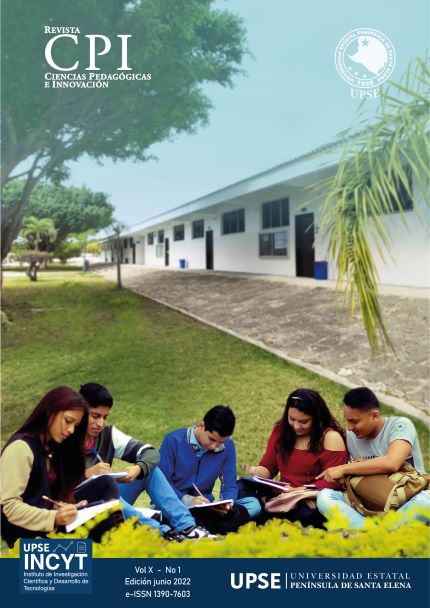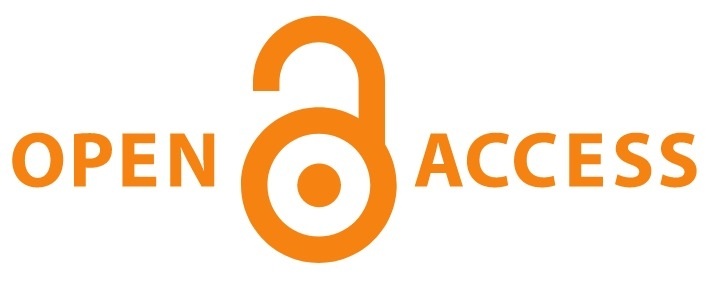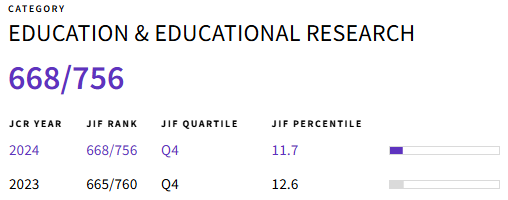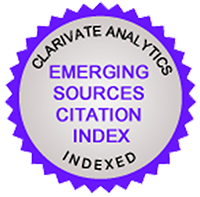Strategy to Improve Oral Interaction in the English Language through the Implementation of Self-regulation Assisted
DOI:
https://doi.org/10.26423/rcpi.v10i2.628Keywords:
self-assessment, feedback, oral communication skills, mobile-assisted language learningAbstract
The ease of oral interaction for users of a foreign language such as English continues to be an academic or professional competitiveness obstacle. For this reason, professionals in the field of language teaching have explored various methods to overcome this limitation. This research aimed to determine the effectiveness of the self-regulation model assisted by mobile devices (smartphones) as a strategic component of the self-assessment process. For this, an "Action Research" was carried out, which lasted seven weeks and involved 27 adolescents, and students of an educational institution in the canton “La Libertad” in Ecuador. The application of an initial oral test determined that they had problems interacting in a conversation. The participants were trained to apply self-regulation through an adapted rubric and the subsequent development of an improvement plan. For this purpose, the participants created dialogues and recorded videos using their mobile devices, self-assessing their performance. The quantitative analysis showed that the strategy significantly impacted interactive communication with a result of d=0.642 according to the Cohen scale. The qualitative results showed that self-regulation as a strategy and adequate feedback supported by mobile devices increased students' motivation to participate in class, improving their oral interaction. The findings of this research have implications for teachers designing curricula and looking for ways to innovate classrooms.
Downloads
References
Al-Jarf, Reima (2006). Large student enrollments in EFL programs: Challenges and consequences. Asian EFL Journal, 8(4), 8-34. https://papers.ssrn.com/sol3/papers.cfm?abstract_id=3864968
Brown, H. D. (2000). Teaching by principles: An interactive approach to language pedagogy. White Plains, NY: Longman. https://books.google.com.ec/books/about/Teaching_by_Principles.html?id=UfTtAAAAMAAJ&redir_esc=y
Brown, Gavin y Harris, Lois (2014). The future of self-assessment in classroom practice: Reframing self- assessment as a core competency. Frontline Learning Research, 3(2014), 22-30. ISSN: 2295-3159. DOI: 10.14786/flr.v2i1.24
Cambridge Support Site (s. f.). Recuperado 15 de octubre de 2022, de https://support.cambridgeenglish.org/hc/en-gb/articles/202838506-Guided-learning-hours
Chen, Y. M. (2008). Learning to self-assess oral performance in English: A longitudinal case study. Language Teaching Research, 12(2), 235–262. DOI: 10.1177/1362168807086293
Conde Gafaro, B., 2019. Exploring Self-Regulated Language Learning with MOOCs. Journal of Interactive Media in Education, 2019(1), p.14. DOI: http://doi.org/10.5334/jime.527
Cohen, A., y Wang, I. (2018) Fluctuation in the functions of language learner strategies. System 74, 169-182.
Desai, Christina y Graves, Stephanie (2006). Instruction via instant Messaging Reference: What’s Happening? The Electronic Library, 24(2), 174- 189. ISSN: 0264-0473. DOI: 10.1108/02640470610660369
EF Education First EPI (2021). EF English Proficiency Index. El ranking mundial más grande según su dominio del inglés. https://www.ef.com.ec/epi/
Ferrance, E. (2000). Themes in education: Action research. Brown University: Educational Alliance. https://thecurrent.educatorinnovator.org/sites/default/files/files/23/act_research.pdf
First, E.-. E. F. (s. f.). Inglés B1: Definición MCER y exámenes | EF SET. EF Standard English Test. Recuperado 15 de octubre de 2022, de https://www.efset.org/es/cefr/b1/
Generales – Ministerio de Educación. (s. f.). Recuperado 15 de octubre de 2022, de https://educacion.gob.ec/generales/
Hattie, John y Timperley, Helen (2007). The Power of Feedback. Review of Educational
Research, 77(1), 81–112. https://doi.org/10.3102/003465430298487
Joo, Soo Hyoung (2016). Self- and Peer-Assessment of Speaking. Studies in Applied Linguistics & TESOL (SALT), 16(2), 68-83. DOI: 10.7916/D8FN2D1S
Ibberson, H. (2012). Can Learners Self-assess Their Speaking Ability Accurately? Multilingual Theory and Practice in Applied Linguistics, 81-84.
Lessard-Clouston, M. (2018). Second Language Acquisition Applied to English Language Teaching. Alexandria: TESOL Press. https://www.researchgate.net/publication/322294293
Luoma, S. (2004). Assessing speaking. New York, NY: Cambridge University Press. https://books.google.es/books?id=JGaBb7y1ss0C&dq=Assessing+speaking&lr=&hl=es&source=gbs_navlinks_s
Ministerio de Educación. (s. f.). Generales. Recuperado 1 de octubre de 2022, de https://educacion.gob.ec/curriculo-lengua-extranjera/
Ministerio de Educación (2012). Ecuadorian in-Service English Teacher Standards. The Language Learning Standards [Estándares de calidad educativa]. Recuperado: https://educacion.gob.ec/wp-content/uploads/downloads/2012/09/estandares_2012_ingles_opt.pdf
Oxford, R. (2003). Learning Styles and Strategies: An Overview. Gala. Retrived from https://www.researchgate.net/publication/254446824
Oxford, R. (2017). Teaching and researching language learning strategies: Self-Regulation in context. 2nd Edition. London: Routledge.
Rambe, Patient y Bere Aaron (2013, August). Using mobile devices to leverage student access to collaboratively-generated resources: A case of WhatsApp instant messaging at a South African University. In 2013 International Conference on Advanced ICT and Education (ICAICTE-13) (pp. 314-320). Atlantis Press. https://doi.org/10.2991/icaicte.2013.66
Richards, J. C. (2015). The Changing Face of Language Learning: Learning Beyond the Classroom. RELC Journal. 46(1), 5-22. ISSN: 0033-6882. DOI: 10.1177%2F0033688214561621
Rivers, William (2002). Autonomy at All Costs: An Ethnography of Metacognitive Self?
Assessment and Self?Management among Experienced Language Learners. The
Modern Language Journal, 85(2), 279–290. DOI: 10.1111/0026-7902.00109
Saito, Hidetoshi (2008). EFL classroom peer assessment: Training effects on rating and commenting. Language Testing, 25(4), 553–581. ISSN: 0265-5322. DOI: 10.1177/0265532208094276
Sánchez, H. y Reyes, C. (2017). Metodología y diseños en la investigación científica. Business Support Aneth.
Topping, Keith y Ehly, Stewart (Eds.) (1998). Peer-assisted learning (1er Edición) ISBN: 9780805825022. https://doi.org/10.4324/9781410603678
Turner, Carolyne y Purpura, James. (2016, 7 marzo). 16. Learning-oriented assessment in second and foreign language classrooms. Handbook of Second Language Assessment, 255-274. https://doi.org/10.1515/9781614513827-018
Wiggins, G. (2012). Seven Keys to Effective Feedback. Educational Leadership 70(1), 10–16. ISSN: 0013-1784. Disponible en: https://eric.ed.gov/?id=EJ1002434
Downloads
Published
Issue
Section
License
El titular de los derechos de autor de la obra, otorga derechos de uso a los lectores mediante la licencia Creative Commons Atribución-NoComercial-CompartirIgual 4.0 Internacional. Esto permite el acceso gratuito inmediato a la obra y permite a cualquier usuario leer, descargar, copiar, distribuir, imprimir, buscar o vincular a los textos completos de los artículos, rastrearlos para su indexación, pasarlos como datos al software o usarlos para cualquier otro propósito legal.
Cuando la obra es aprobada y aceptada para su publicación, los autores conservan los derechos de autor sin restricciones, cediendo únicamente los derechos de reproducción, distribución para su explotación en formato de papel, así como en cualquier otro soporte magnético, óptico y digital.

















